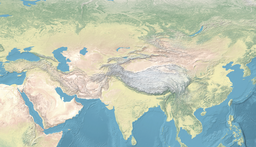| Lake Elton Эльтон | |
|---|---|
 The shores of Lake Elton | |
| Location | Volgograd Oblast |
| Coordinates | 49°8′0″N 46°40′0″E / 49.13333°N 46.66667°E |
| Type | Hypersaline lake |
| Basin countries | Russia |
| Surface area | 150 km2 (58 sq mi) |
| Max. depth | 0.6 m (2 ft 0 in) |
| Surface elevation | −18 m (−59 ft) |

Lake Elton (Russian: Эльтон; Kazakh: Эльтон, romanized: Elton) is a salt lake in Volgograd Oblast, Russia, near the border with Kazakhstan. It has an area of 152 km² and is about 0.1 m deep (in spring 0.7 to 0.8 m). Its surface is 18 m below sea level.[1] The lake’s name originates from the Mongol language: “Altyn-Nor” (Golden Bottom). Long ago local nomads used the lake’s mineral-rich mud for skin and respiratory treatments.[2] For centuries, Lake Elton was a favorite location for Russian rulers and nobles. One can still see remnants of Empress Yekaterina II’s “bath” there.[2]
It is the largest mineral lake in Europe and one of the most mineralized in the world. The lake is filled with saturated salt solution. Mineralization is 200-500 g/L. Salt, extracted from the lake since the early 18th century, is used for the production of magnesium chloride.[3] The water contains Dunaliella salina algae that give a reddish shade to the lake. At the bottom of the lake - deposits of salts (mainly NaCl, KCl) and under them a layer of mineral hydrogen sulfide mud.
YouTube Encyclopedic
-
1/3Views:9743522 121
-
Озеро Эльтон! Lake Elton
-
День на озере "Эльтон" / A day on the lake Elton (7.05.2017)
-
По ту сторону Эльтона
Transcription
Transportation
A bus ride can be taken from Volgograd (6 hours mostly because of long stops in rural towns) and also by train from Saratov and Astrakhan (also 6 hours) can lead travelers to the area.
History
Salt was excavated from Elton beginning in the early eighteenth century.[4] Before 1865 the government was the excavator; from 1865–1882 the lake was heavily used by private businesses.

A spa resort has been located near the lake since 1910 and a sanatorium since 1945. Sulfide silt mud and brine from Elton are claimed to have anti-inflammatory, detoxifying, analgesic, relaxing and revitalizing properties.[5]
Elton Ultra Trail Run
The Elton Ultra Trail is one of Russia's toughest races. There are two distances of 38 km and 160 km. It was first organised in 2014.
 |
 |
References
- ^ Эльтон (озеро), Great Soviet Encyclopedia
- ^ a b Egorov, Boris (2018-10-11). "Why did Russia's tsars love Lake Elton?". www.rbth.com. Retrieved 2021-07-09.
- ^ "Lake Elton | lake, Russia". Encyclopedia Britannica. Retrieved 2021-07-09.
- ^ "Lake Elton". Encyclopædia Britannica. Retrieved 2013-10-18.
- ^ "Elton sanatorium".
External links



